Welcome!
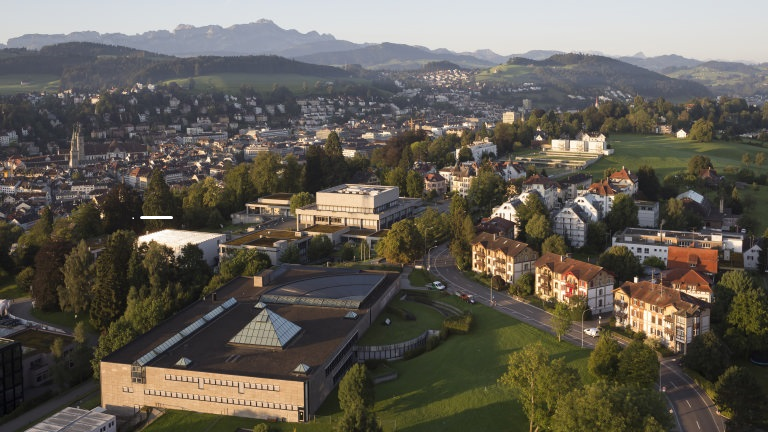
The University of St. Gallen – more precisely the Hochschule für Wirtschafts-, Rechts- und Sozialwissenschaften sowie Internationale Beziehungen (HSG) – which was founded in 1898, may be one of the smaller universities of Switzerland, but has the largest school of economic sciences in the German-speaking area. Professional and managerial staff for economy, public administration, and administration of justice is educated here. Currently, 8,000 students are enrolled at the campus at Rosenberg mountain above the city. The HSG is known for its ideal mix of research and practice. It is further known for the organization of internationally respected conferences.
On that note: Welcome to WI 2017!
History
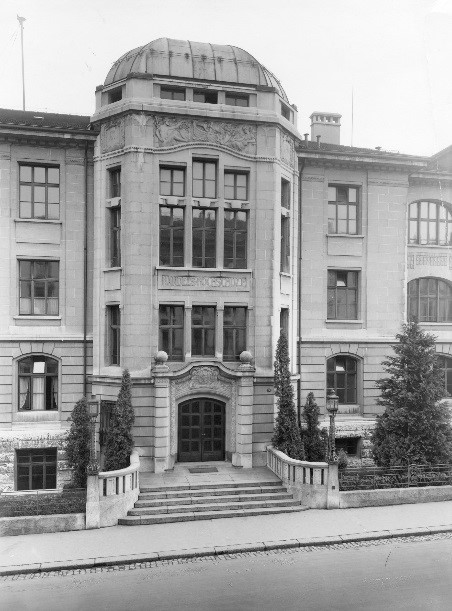
1898
1911
1938
1954
1963
1986
1989
1995
2008
2011
1911
1938
1954
1963
1986
1989
1995
2008
2011
Founding of a commercial academy in the center of St.Gallen
Renaming into “Handels-Hochschule“ (commercial college) and occupation of first own building
The foundation under private law turns into a public-law institution
Granting of right to award doctorates
New Higher Education Act: sponsorship is passed on to the city and Canton of St.Gallen in equal shares
Occupation of new building at Rosenberg mountain
Renaming into “Hochschule für Wirtschafts- und Sozialwissenschaften“ (academy for economics and social sciences)
Canton of St.Gallen assumes sole responsibility for the HSG
Occupation of new building with library and main auditorium
Inauguration of the advanced training center Holzweid
Renaming into «Universität St.Gallen - Hochschule für Wirtschafts-, Rechts- und Sozialwissenschaften (HSG)»
Inauguration of the Executive Campus (enlargement of the advanced training center Holzweid)
Re-opening of rebuilt and extended campus
Renaming into “Handels-Hochschule“ (commercial college) and occupation of first own building
The foundation under private law turns into a public-law institution
Granting of right to award doctorates
New Higher Education Act: sponsorship is passed on to the city and Canton of St.Gallen in equal shares
Occupation of new building at Rosenberg mountain
Renaming into “Hochschule für Wirtschafts- und Sozialwissenschaften“ (academy for economics and social sciences)
Canton of St.Gallen assumes sole responsibility for the HSG
Occupation of new building with library and main auditorium
Inauguration of the advanced training center Holzweid
Renaming into «Universität St.Gallen - Hochschule für Wirtschafts-, Rechts- und Sozialwissenschaften (HSG)»
Inauguration of the Executive Campus (enlargement of the advanced training center Holzweid)
Re-opening of rebuilt and extended campus
The HSG in Numbers

With the occupation of the new building of the HSG in 1963, the University of St.Gallen had 1,150 enrolled students. Since then, the numbers of students increased greatly. Currently, more than 8,200 students are enrolled, 20% of which are at the assessment level, 33% at Bachelor level, 39% at Master level, and 8% at doctorate level. The percentage of women amounts to approximately a third. The percentage of foreign students was limited to maximum 25% in 1963.
Around 100 professors, ca. 70 assistance professors, and permanent lecturers mentor the students. Overall, the HSG employs more than 2,700 people (= 955 full-time positions).
More information
Organization and Finances
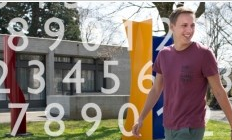
«We are one of Europe’s leading business universities, globally recognized as “think tank“ for current problems of economic and social sectors, as well as the promotion of personalities with integrative thinking that are entrepreneurial and acting responsibly.»
Point of focus of the University of St.Gallen lie in the education and training of professional and managerial staff for economy, public administration, and administration of justice. The university is divided into 5 Schools, 41 institutes, research sites, and centers. The schools are in charge of teaching and offer Bachelor’s and Master’s programs. The institutes rather represent the practice-oriented character of the university and are hence primarily working in the field of practice-oriented research. The Executive School of Management, Technology and Law (ES-HSG) excels regarding its wide variety of advanced training.
The consolidated expenses of the University of St.Gallen amounted to CHF 220.6 million in 2014. Public authorities support approximately 50% of that. The other 50%is generated by the HSG itself. First of all, the institutes, research sites, and centers substantially contribute to the proceeds of the university with their accomplishments in the fields of research, advanced training, and service.
Teaching

An integrative perspective, which goes beyond the scope of the area of studies, is the basis for the integral and practice-oriented training at the HSG. Students are meant to become aware of their social responsibility and should actively claim it. The organization of studies promotes critical thinking and dealing with social and environmental challenges. With almost 50% foreign lecturers and 34% foreign students from more than 80 nations, the University of St.Gallen is internationally and multi-culturally shaped. With its EQUISand AACSBaccreditation, two international hallmarks of excellence honor the integral studies. Students benefit from membership in and cooperation with international networks such as CEMS, PIM, or APSIA. The HSG maintains partnerships with about 180 universities worldwide , which gives students the opportunity to attain double degrees or do exchange semesters in cooperation with other universities. Moreover, the HSG has two representations in Singapore and Sao Paolo.
Study courses at the HSG can be completed in German or English language. Since the fall semester of 2012, the assessment year (first year of studies) has been offered entirely in both languages. Afterwards, majors in business administration, economics, and international affairs can be studied in a flexible mix of both languages. When obtaining their Master’s degree, 94% of the students have gained practical experience for a minimum of 6 months, and 83% of them already have specific job offers or a permanent position.
Information concerning assessement year, Bachelor’s degree , Master’s degree und doctorate .
Research
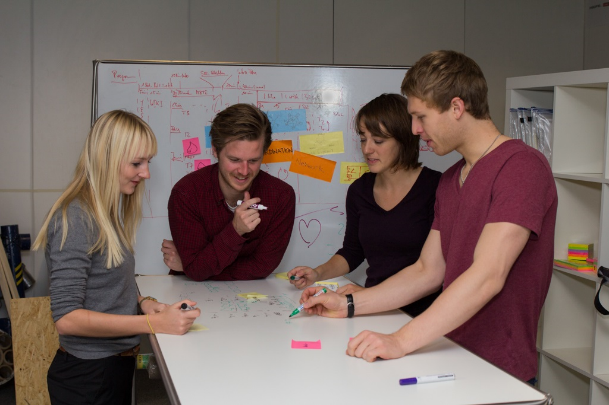
Aside from basic research, the University of St.Gallen has always conducted greatly practice-related research. The majority of this research takes place at the 41 institutes, research sites, and centers, as well as at the about 80 professorial chairs. With its institute model, the HSG distinguishes itself strongly from other universities in Switzerland. Several research cooperations with renowned practice partners such as SAP, SBB, BMW, Bosch, Hilti, and more exist. ( current reseach findings/papers of the HSG)
With the research platform Alexandria, the HSG has been following an “open access policy“ since 2004, aiming at guaranteeing public access to as much research findings as possible. In 2014, the platform included more than 35,000 publications and more than 7.5 million page views.
The strongly practice-related research resulted into more than 100 spinoffs and many startups originating from the University of St.Gallen. Business activities of the students are promoted and supported, for example by the Centre for Entrepreneurship.
Advanced Training
The University of St.Gallen offers a wide variety of advanced training opportunities, which are known for their practical relevance and topicality, and by which it generates revenues of about CHF 44.5 million per year. Advanced training courses are offered by the Executive School (ES-HSG), but also by several institutes. The Institute of Information Management also offers a wide variety of advanced training.
Quality Management and Rankings

Internationally recognized quality is an important goal of the HSG. Hence, the ranking became more and more important in the last years. For the HSG, three rankings are of priority, which are internationally significant and simultaneously match the university’s fields of action regarding teaching, advanced training, and research: the ranking of the Financial Times, the CHE-Ranking (Center for Higher Education Development), and the Handelsblatt BWL ranking. Regarding the Financial Times ranking, the Master’s program in Management (Strategy and International Management SIM) is of special importance, as it has been in first place for years. Regarding the Handelsblatt BWL ranking, HSG’s business research was in first place in 2014.
Outlook
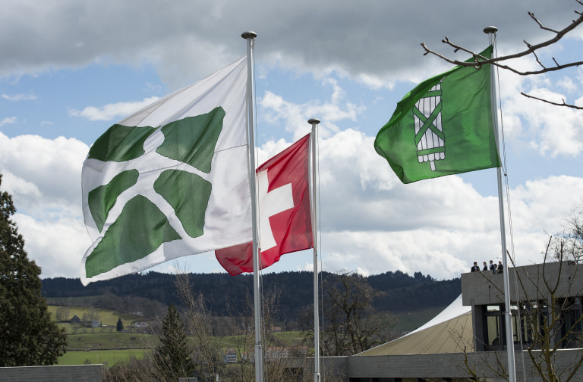
For its future, the HSG has a clear vision, which is adapted to the changing circumstances every five years. To realize this vision, great efforts are necessary in the next years, regarding both the orientation of the course ranges and the enlargement of the spaciousness (zukunftHSG).
In the teaching field, the quick technological progress results in a new learning and working behavior of the students. New opportunities such as MOOCs (massive open online courses) «flipping», «blended learning», and «collaborative learning» are already offered or in preparation.
The Institute of Information Management (IWI-HSG) is an active part in the development of new teaching forms.
To realize the ambitious aims, an expansion of premises is essential, as the spatial possibilities of the University of St.Gallen do not correspond with the increasing number of students ever since. That is why several expansions are planned, on the site of the university itself (expansion of the library building) and by building an additional campus at Platztor near the old town.
The HSG as Place of Architecture and Art
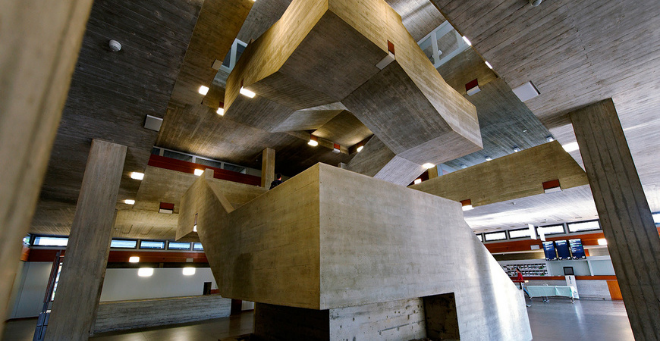
Today, the “new building“ of the HSG of 1963 is regarded as important image of the architecture of the time period of the 1960s. It is a descriptive example of the so-called “brutalism“ following Le Corbusier, with construction and material being uncompromisingly visible.
The University of St.Gallen is not only an educational institution, but also a much recognized place of the art: On campus, 46 artworks by Arp, Giacometti, Miró, Richter, Burckhardt, Tàpies, and many others can be found. The artworks are integrated into the architecture and the students’ everyday life. That is why almost all pieces were created by the artists for their respective places and have not been installed afterwards. This creates a dialogue of art and architecture, which can be seen in all buildings. Extensive explanations can be found here.